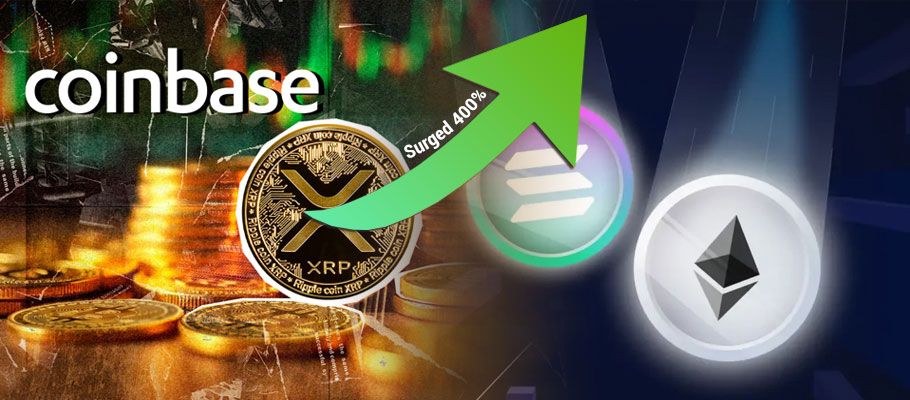
Published: May 14th, 2025
Coinbase stockholders won't have been hugely surprised to learn that the exchange's first quarter 2025 results were lacklustre. With Bitcoin sliding by 11 per cent in Q1, retail crypto trading was bound to sink.
And sink it did. The company's earnings report, filed with the SEC last week, showed that transaction volume fell by 17 percent in the first three months of 2025, dropping to $78 billion. The firm's top line also slumped by 10 per cent to $2 billion compared to Q1 2024, while net income plunged a whopping 94 percent to $66 million.
Yet amid the bad news, crypto traders will have noted at least one interesting outcome. The value of altcoin XRP held on Coinbase rose significantly across the quarter, creating more transaction revenue for the exchange than Ethereum or Solana.
Figures in the SEC filing show a 400 percent surge in XRP's value on Coinbase over the last year. XRP-generated earnings accounted for 18 percent of all retail trading revenue, roughly equal to that of ETH and SOL combined. Only BTC accounted for more revenue than XRP within the quarter.
XRP's revenue figures are even more notable given the exchange halted trades and delisted the Ripple-linked coin for two years.
Coinbase relisted XRP in 2023 after a court ruled that selling XRP on crypto exchanges did not violate securities laws. XRP also generated the exchange's biggest increase in crypto deposits over the last 12 months.
In 2020 The Securities and Exchange Commission (SEC) filed a civil suit against Ripple Labs Inc., accusing the payment protocol developer of violating investor protection regulation in its sales of XRP.
The suit, one of the most prominent actions from the SEC targeting a cryptocurrency company. It came just as Jay Clayton, the agency's chairman, is departing at the end of the first Trump presidency. Over the previous few years, the agency had prosecuted and successfully won several civil suits against crypto startups, mostly on charges of trampling securities laws when raising capital via initial coin offerings (ICO).
However, none of the SEC's previous cases had targeted a major player like Ripple. The company was valued at about $10 billion during a funding round in 2019, and its XRP altcoin was the fourth-largest crypto coin by market capitalization. At the time of the action it was the third-largest coin for the better part of the year, only slipping a position after the SEC action triggered a massive selloff.
The agency alleged that Ripple created an information vacuum that let the company market XRP to traders without providing enough information to make an informed decision. The SEC complaint also said Ripple continued to hold a significant amount of XRP without a formal registration statement in place.
Regulators said that Ripple could still monetize their XRP holding while relying on ‘information asymmetry’ to continue making market gains, a situation that creates a considerable risk to investors.
Following news of the suit, the price of XRP tanked by almost 25%. According to data from CoinDesk, the drop came after a 17% slip from the previous day when the company divulged that it expected legal action from the SEC.
The SEC sued the company, its CEO, Brad Garlinghouse, and Chris Larsen, the co-founder. The substance of the SEC's case was that XRP was not a cryptocurrency, but a security with similar characteristics to shares of a company. The suit alleged that Ripple conducted an unregistered securities offering and disposed of some $1.3 billion worth of XRP.
The suit went on to accuse Ripple Labs Inc., Garlinghouse, and Larsen of failing to duly register the company's offer and sale of billions of XRP coins to retail investors. The complaint added that Ripple Labs and its key executives denied potential investors adequate disclosures about the company, its business, and other crucial long-standing protections that a robust public market system considers fundamental in failing to register.
Ripple denied these charges and eventually had them dismissed. In its rejoinder, the company said that XRP is a virtual currency and should not go through the same registration processes of an investment contract. Ripple also questioned the suit's timing seeing that it came just as the SEC chairman was standing down. The firm noted that the US government and some financial regulators had previously acknowledged XRP as a currency.
Following the slip in price, XRP has ceded its position in the valuation log to Tether (USDT), a dollar-pegged stablecoin often used by investors to trade crypto. According to CoinMarketCap data, USDT surpassed XRP after the action was announced.
The "security" label matters in crypto because it could change the outlook for a coin and expose it to strict new rules, which might heavily impact the cryptocurrency. Ripple owned 55% of the 100 billion XRP tokens in circulation. Besides, it earns by selling some of its XRP haul each quarter.
In an interview with CNBC, Garlinghouse said that there is confusion because of the outlook. Ripple is a company with shareholders. The company raised capital from venture capitalists and financial institutions while XRP is a different thing altogether, Garlinghouse added.
He said that for the SEC to come out now with this suit is incredible considering that XRP trades as a currency in about a couple of exchanges worldwide, and no country has come out to treat the coin as security. The CEO said that the SEC's actions send ominous signs to innovations in the blockchain sphere.
XRP was created and distributed by Ripple Labs Inc. in 2012. The coin facilitates fast cross-border value transfers. The coin's price has risen along with that of Bitcoin and other altcoins in 2020. However, where Bitcoin has risen far above its 2017 all-time high, XRP still sits 90% below its record peak in 2017.
Ripple, the company, was last valued at $10 billion and funded by Santander Group, Strategic Business Innovator Group (SBI Holdings), Andreessen Horowitz, the Founders Fund established by Peter Thiel, and Lightspeed as shareholders.